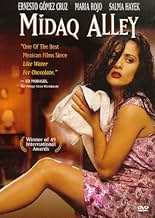VALUTAZIONE IMDb
7,3/10
3523
LA TUA VALUTAZIONE
Aggiungi una trama nella tua linguaThe lives of men and women living on Callejón de los Milagros in Mexico City.The lives of men and women living on Callejón de los Milagros in Mexico City.The lives of men and women living on Callejón de los Milagros in Mexico City.
- Premi
- 27 vittorie e 13 candidature totali
Recensioni in evidenza
My Cable company just recently added the new Spanish HBO to my system. And I just so happen to be flipping through these channels looking for something to watch (you know, it's really late and there is nothing else on), well I came to the Spanish HBO and a movie was just starting with sub-titles. I thought, hey why not. This movie "Midaq Alley" was excellent. It had everything in a movie you could asked for. I recommend this movie highly to everyone, no matter what your ethnic background is - you will walk away from this movie with something. Trust me.
The movie Midaq Alley follows different characters to show everyday life for a small community in Mexico while the viewer sees the same story from a different perspective. I think the same scene placed at the beginning of each synopsis that shows some older men playing dominoes in Don Ru's cantina is symbolic because it is representative of an ordinary day and also shows how people in the community gather together and share stories and get to know one another. I feel that it represents the culture in Mexico and emphasizes how everyone looks out for one another, like how Ubaldo looks out for Eusebia's sadness and how Dona Cata looks out for Susanita's feelings, and also how Abel looks out for Chava's well being. By making this scene the establishing shot for each time the viewer sees a different point of view begin, the director is trying to portray how significant gathering for a game of Dominos in the cantina is in the daily lives of those in Midaq Alley. There are also some street scenes where it seems everyone knows one another. I wonder if it is a custom to be so close to neighbors and care for them like family, or if it has to do with the small size of their community. I was not really surprised that the ending was not extremely dramatic. I think it was very fitting to leave things the way they were because the movie was a portrayal of everyday life. I feel that the scenes of the men playing Dominos at Don Ru's cantina are the most important scenes of the film because it tells the viewer that although the characters presented have complex lives, the actions they take to reach their individual happiness are mundane when you take a look at the bigger picture, especially when you realize the men playing dominoes are older and have gone through many life experiences, perhaps they are trying to tell us to relax and not take life so seriously.
This movie is an impressive and exciting story about the people,their feelings,love,desperation,anger and hope.Although the scenario is a little bit melodramatic , the film is a must indeed.It is quite different from the blockbusters with happy ends because it is real and outstanding.Several lives and fates are mixed in it.Every character has their own unique personality.They all have to take decisions for their lives and have to fight for happiness.The actors are very nice.The stunning Hayek makes a good performance .Gomes Krus is also convincing as a man who becomes gay after 30 years marriage.The supporting roles are also well-played.Don't think that this is some kind of soap opera- it is something deeper...
This is a very interesting film. The three stories in the film are connected in some way, and yet not completely connected. The first story explores the issue of homosexuality, which I think is a brave idea in a country that is quite religious. The film is beautifully shot, and the locations seem realistic and reflect the daily life of the people.
This film was not made for Americans, or even with the thought of marketing outside the USA. Just like Hollywood remakes will redo a story for the US, this took a story written for Cairo and transplanted it to Mexico City without a trace of the original setting. It is framed and acted much like a stage play, and the focus is on the people. It's painful to watch at times, because the story grinds your nose against stories of people who are getting through some unpleasant times in some unpleasant ways and the pace does not let you escape - it is clear they want you to endure something of what the characters are going through. The acting is generally good, there are convincing portraits of a half dozen main characters and the supports aren't bad. Yep, the overall ending is predictable, but not unbelievable and a few of the side stories might surprise you along the way.
I watched the DVD version. It has no extras or options. You get dialog in Spanish, English subtitles, in 4:3 format - no choices. Sound is stereo, color is ok and picture is competent.
I watched the DVD version. It has no extras or options. You get dialog in Spanish, English subtitles, in 4:3 format - no choices. Sound is stereo, color is ok and picture is competent.
Lo sapevi?
- QuizVeronica Falcón's debut.
- ConnessioniFeatured in ¿Quién diablos es Yuliet? (1997)
I più visti
Accedi per valutare e creare un elenco di titoli salvati per ottenere consigli personalizzati
- How long is Midaq Alley?Powered by Alexa
Dettagli
- Tempo di esecuzione2 ore 20 minuti
- Colore
- Mix di suoni
- Proporzioni
- 1.85 : 1
Contribuisci a questa pagina
Suggerisci una modifica o aggiungi i contenuti mancanti

Divario superiore
By what name was El callejón de los milagros (1995) officially released in Canada in English?
Rispondi

































